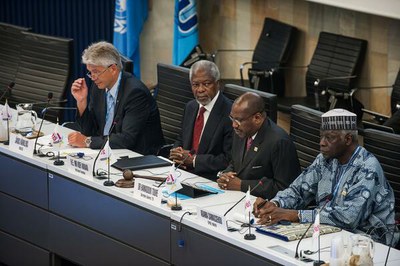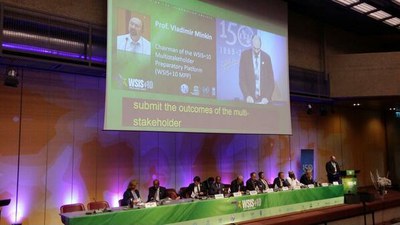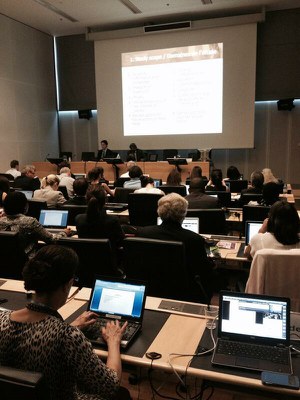WSIS+10 High Level Event: A Bird's Eye Report
The WSIS+10 High Level was organised by the ITU and collaborative UN entities on June 9-13, 2014. It aimed to evaluate the progress on implementation of WSIS Outcomes from Geneva 2003 and Tunis 2005, and to envision a post-2015 Development Agenda. Geetha Hariharan attended the event on CIS' behalf.
The World Summit on Information Society (WSIS) +10 High Level Event (HLE) was hosted at the ITU Headquarters in Geneva, from June 9-13, 2014. The HLE aimed to review the implementation and progress made on information and communication technology (ICT) across the globe, in light of WSIS outcomes (Geneva 2003 and Tunis 2005). Organised in three parallel tracks, the HLE sought to take stock of progress in ICTs in the last decade (High Level track), initiate High Level Dialogues to formulate the post-2015 development agenda, as well as host thematic workshops for participants (Forum track).
The High Level Track:

Opening Ceremony, WSIS+10 High Level Event (Source)
The High Level track opened officially on June 10, 2014, and culminated with the endorsement by acclamation (as is ITU tradition) of two Outcome Documents. These were: (1) WSIS+10 Statement on the Implementation of WSIS Outcomes, taking stock of ICT developments since the WSIS summits, (2) WSIS+10 Vision for WSIS Beyond 2015, aiming to develop a vision for the post-2015 global information society. These documents were the result of the WSIS+10 Multi-stakeholder Preparatory Platform (MPP), which involved WSIS stakeholders (governments, private sector, civil society, international organizations and relevant regional organizations).
The MPP met in six phases, convened as an open, inclusive consultation among WSIS stakeholders. It was not without its misadventures. While ITU Secretary General Dr. Hamadoun I. Touré consistently lauded the multi-stakeholder process, and Ambassador Janis Karklins urged all parties, especially governments, to “let the UN General Assembly know that the multi-stakeholder model works for Internet governance at all levels”, participants in the process shared stories of discomfort, disagreement and discord amongst stakeholders on various IG issues, not least human rights on the Internet, surveillance and privacy, and multi-stakeholderism. Richard Hill of the Association for Proper Internet Governance (APIG) and the Just Net Coalition writes that like NETmundial, the MPP was rich in a diversity of views and knowledge exchange, but stakeholders failed to reach consensus on crucial issues. Indeed, Prof. Vlamidir Minkin, Chairman of the MPP, expressed his dismay at the lack of consensus over action line C9. A compromise was agreed upon in relation to C9 later.
Some members of civil society expressed their satisfaction with the extensive references to human rights and rights-centred development in the Outcome Documents. While governmental opposition was seen as frustrating, they felt that the MPP had sought and achieved a common understanding, a sentiment echoed by the ITU Secretary General. Indeed, even Iran, a state that had expressed major reservations during the MPP and felt itself unable to agree with the text, agreed that the MPP had worked hard to draft a document beneficial to all.
Concerns around the MPP did not affect the review of ICT developments over the last decade. High Level Panels with Ministers of ICT from states such as Uganda, Bangladesh, Sweden, Nigeria, Saudi Arabia and others, heads of the UN Development Programme, UNCTAD, Food and Agriculture Organisation, UN-WOMEN and others spoke at length of rapid advances in ICTs. The focus was largely on ICT access and affordability in developing states. John E. Davies of Intel repeatedly drew attention to innovative uses of ICTs in Africa and Asia, which have helped bridge divides of affordability, gender, education and capacity-building. Public-private partnerships were the best solution, he said, to affordability and access. At a ceremony evaluating implementation of WSIS action-lines, the Centre for Development of Advanced Computing (C-DAC), India, won an award for its e-health application MOTHER.
The Outcome Documents themselves shall be analysed in a separate post. But in sum, the dialogue around Internet governance at the HLE centred around the success of the MPP. Most participants on panels and in the audience felt this was a crucial achievement within the realm of the UN, where the Tunis Summit had delineated strict roles for stakeholders in paragraph 35 of the Tunis Agenda. Indeed, there was palpable relief in Conference Room 1 at the CICG, Geneva, when on June 11, Dr. Touré announced that the Outcome Documents would be adopted without a vote, in keeping with ITU tradition, even if consensus was achieved by compromise.
The High Level Dialogues:

Prof. Vladimir Minkin delivers a statement. (Source)
The High Level Dialogues on developing a post-2015 Development Agenda, based on WSIS action lines, were active on June 12. Introducing the Dialogue, Dr. Touré lamented the Millennium Development Goals as a “lost opportunity”, emphasizing the need to alert the UN General Assembly and its committees as to the importance of ICTs for development.
As on previous panels, there was intense focus on access, affordability and reach in developing countries, with Rwanda and Bangladesh expounding upon their successes in implementing ICT innovations domestically. The world is more connected than it was in 2005, and the ITU in 2014 is no longer what it was in 2003, said speakers. But we lack data on ICT deployment across the globe, said Minister Knutssen of Sweden, recalling the gathering to the need to engage all stakeholders in this task. Speakers on multiple panels, including the Rwandan Minister for CIT, Marilyn Cade of ICANN and Petra Lantz of the UNDP, emphasized the need for ‘smart engagement’ and capacity-building for ICT development and deployment.
A crucial session on cybersecurity saw Dr. Touré envision a global peace treaty accommodating multiple stakeholders. On the panel were Minister Omobola Johnson of Nigeria, Prof. Udo Helmbrecht of the European Union Agency for Network and Information Security (ENISA), Prof. A.A. Wahab of Cybersecurity Malaysia and Simon Muller of Facebook. The focus was primarily on building laws and regulations for secure communication and business, while child protection was equally considered.
The lack of laws/regulations for cybersecurity (child pornography and jurisdictional issues, for instance), or other legal protections (privacy, data protection, freedom of speech) in rapidly connecting developing states was noted. But the question of cross-border surveillance and wanton violations of privacy went unaddressed except for the customary, unavoidable mention. This was expected. Debates in Internet governance have, in the past year, been silently and invisibly driven by the Snowden revelations. So too, at WSIS+10 Cybersecurity, speakers emphasized open data, information exchange, data ownership and control (the right to be forgotten), but did not openly address surveillance. Indeed, Simon Muller of Facebook called upon governments to publish their own transparency reports: A laudable suggestion, even accounting for Facebook’s own undetailed and truncated reports.
In a nutshell, the post-2015 Development Agenda dialogues repeatedly emphasized the importance of ICTs in global connectivity, and their impact on GDP growth and socio-cultural change and progress. The focus was on taking this message to the UN General Assembly, engaging all stakeholders and creating an achievable set of action lines post-2015.
The Forum Track:

Participants at the UNESCO session on its Comprehensive Study on Internet-related Issues (Source)
The HLE was organized as an extended version of the WSIS Forum, which hosts thematic workshops and networking opportunities, much like any other conference. Running in parallel sessions over 5 days, the WSIS Forum hosted sessions by the ITU, UNESCO, UNDP, ICANN, ISOC, APIG, etc., on issues as diverse as the WSIS Action Lines, the future of Internet governance, the successes and failures of WCIT-2012, UNESCO’s Comprehensive Study on Internet-related Issues, spam and a taxonomy of Internet governance.
Detailed explanation of each session I attended is beyond the scope of this report, so I will limit myself to the interesting issues raised.
At ICANN’s session on its own future (June 9), Ms. Marilyn Cade emphasized the importance of national and regional IGFs for both issue-awareness and capacity-building. Mr. Nigel Hickson spoke of engagement at multiple Internet governance fora: “Internet governance is not shaped by individual events”. In light of criticism of ICANN’s apparent monopoly over IANA stewardship transition, this has been ICANN’s continual response (often repeated at the HLE itself). Also widely discussed was the role of stakeholders in Internet governance, given the delineation of roles and responsibilities in the Tunis Agenda, and governments’ preference for policy-monopoly (At WSIS+10, Indian Ambassador Dilip Sinha seemed wistful that multilateralism is a “distant dream”).
This discussion bore greater fruit in a session on Internet governance ‘taxonomy’. The session saw Mr. George Sadowsky, Dr. Jovan Kurbalija, Mr. William Drake and Mr. Eliot Lear (there is surprisingly no official profile-page on Mr. Lear) expound on dense structures of Internet governance, involving multiple methods of classification of Internet infrastructure, CIRs, public policy issues, etc. across a spectrum of ‘baskets’ – socio-cultural, economic, legal, technical. Such studies, though each attempting clarity in Internet governance studies, indicate that the closer you get to IG, the more diverse and interconnected the eco-system gets. David Souter’s diagrams almost capture the flux of dynamic debate in this area (please see pages 9 and 22 of this ISOC study).
There were, for most part, insightful interventions from session participants. Mr. Sadowsky questioned the effectiveness of the Tunis Agenda delineation of stakeholder-roles, while Mr. Lear pleaded that techies be let to do their jobs without interference. Ms. Anja Kovacs raised pertinent concerns about including voiceless minorities in a ‘rough consensus’ model. Across sessions, questions of mass surveillance, privacy and data ownership rose from participants. The protection of human rights on the Internet – especially freedom of expression and privacy – made continual appearance, across issues like spam (Question 22-1/1 of ITU-D Study Group 1) and cybersecurity.
Conclusion:
The HLE was widely attended by participants across WSIS stakeholder-groups. At the event, a great many relevant questions such as the future of ICTs, inclusions in the post-2015 Development Agenda, the value of muti-stakeholder models, and human rights such as free speech and privacy were raised across the board. Not only were these raised, but cognizance was taken of them by Ministers, members of the ITU and other collaborative UN bodies, private sector entities such as ICANN, technical community such as the ISOC and IETF, as well as (obviously) civil society.
Substantively, the HLE did not address mass surveillance and privacy, nor of expanding roles of WSIS stakeholders and beyond. Processually, the MPP failed to reach consensus on several issues comfortably, and a compromise had to be brokered.
But perhaps a big change at the HLE was the positive attitude to multi-stakeholder models from many quarters, not least the ITU Secretary General Dr. Hamadoun Touré. His repeated calls for acceptance of multi-stakeholderism left many members of civil society surprised and tentatively pleased. Going forward, it will be interesting to track the ITU and the rest of UN’s (and of course, member states’) stances on multi-stakeholderism at the ITU Plenipot, the WSIS+10 Review and the UN General Assembly session, at the least.


